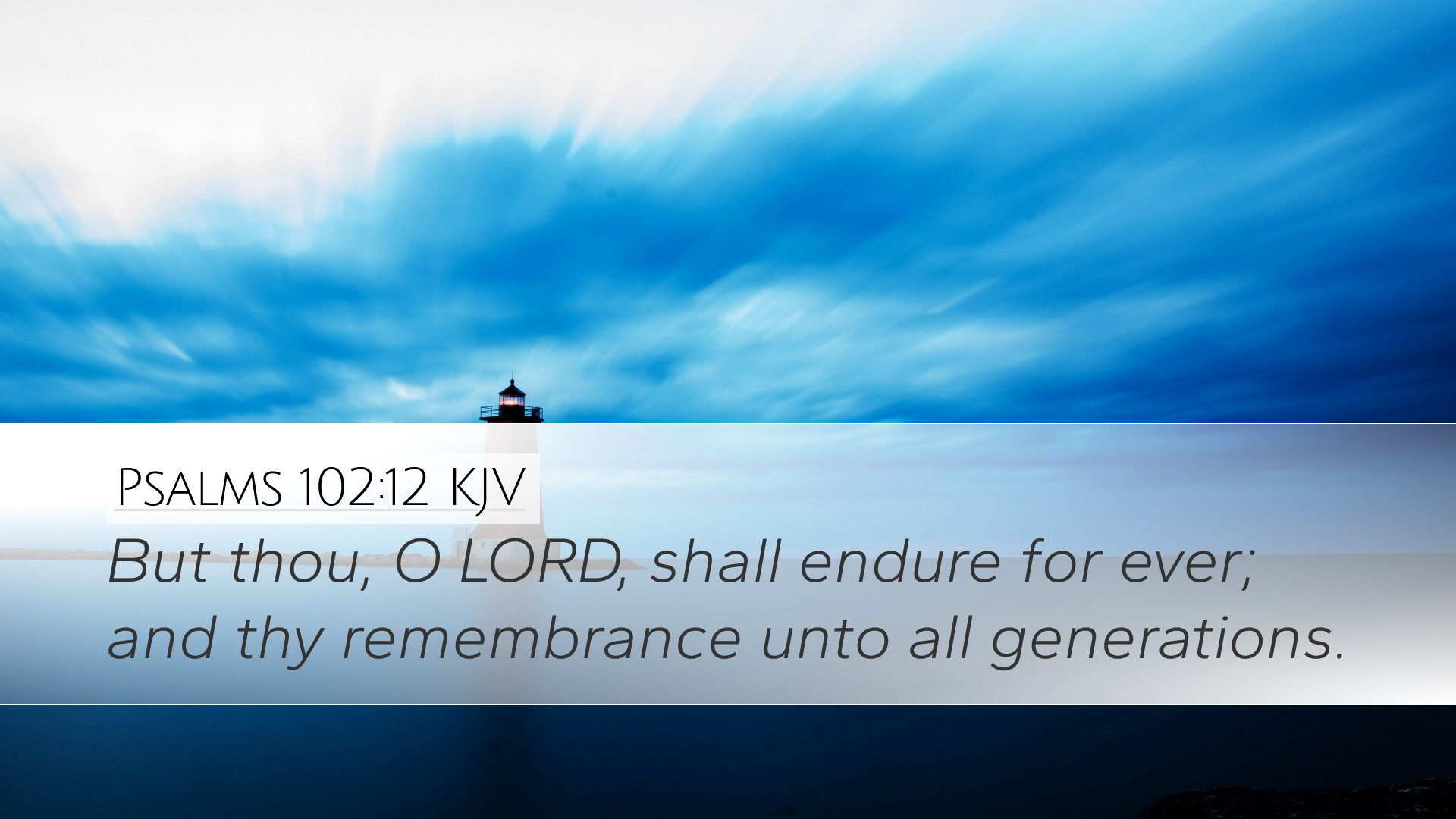Commentary on Psalms 102:12
Verse: Psalms 102:12 - "But you, O Lord, are enthroned forever; the fame of your name endures through all generations."
This poignant verse encapsulates themes of God's eternal nature and unchanging character amidst human suffering and transient existence. In examining this verse, various public domain commentaries provide profound insights that are significant for pastors, students, theologians, and Bible scholars.
Context and Overview
Psalms 102 is categorized as a penitential psalm, likely penned during a time of great distress. The psalmist reflects on personal affliction while simultaneously recognizing God's everlasting sovereign authority. The contrast between human frailty and divine permanence is central in this passage.
Exposition from Matthew Henry
Matthew Henry emphasizes the majesty and sovereignty of God as the eternal King. He notes:
- God's Eternity: "But thou, O Lord, shalt endure for ever." Henry highlights the assurance that, unlike human beings who are fleeting and temporary, God remains unaffected by time.
- Divine Majesty: Henry notes that God's enthronement signifies His rule and authority extending across all ages. This serves as a powerful reminder that despite the tumultuous seasons of life, God remains sovereign and in control.
- Endurance of God’s Fame: "The fame of your name endures through all generations." This enduring fame speaks to the ways God has revealed Himself through the ages, consistently demonstrating faithfulness and power.
Insights from Albert Barnes
Albert Barnes elucidates the theological implications of God’s unchanging nature. According to Barnes:
- Contrast with Humanity: "As for man, his days are like grass; as a flower of the field, so he flourisheth." He contrasts human frailty with God's permanence, reinforcing the notion that while humans are transient, God’s name and reputation endure forever.
- Theological Reflection: Barnes encourages believers to place their trust in God’s eternal character, especially in times of distress. The eternal aspect of God's nature offers a foundation for hope.
- Generational Faithfulness: Barnes notes that God's fame is not merely for a moment but extends through generations, indicating the ongoing revelation of God's character throughout history.
Adam Clarke's Commentary
Adam Clarke offers rich theological reflections on the psalmist’s acknowledgment of God’s sovereignty:
- God’s Throne: Clarke elaborates on the imagery of God on His throne, which signifies dominion over creation and human affairs. He connects this imagery with the assurance that God’s reign is not limited but everlasting.
- Hope in Distress: Clarke underscores that the psalmist’s declaration is a source of strength for believers facing trials. It encourages the faithful to lift their eyes to God, regardless of their present circumstances.
- Recognition of God’s Name: Clarke explains the significance of the name of God in biblical thought. He notes that to know God’s name is to understand his attributes and character: mercy, justice, love, and faithfulness.
Thematic Reflections
Combining these insights, we can draw several key themes from Psalms 102:12:
- The Everlasting Nature of God: Central to Christian theology is the belief in God's eternal nature. He exists beyond the confines of time and space, making Him a reliable refuge in times of trouble.
- Human Fragility vs. Divine Permanence: The transient nature of human life is starkly contrasted with God’s unchanging essence. This confrontation encourages humility and trust in the Divine.
- Assurance in Suffering: The psalmist's declaration is not merely a statement of fact but a source of comfort and hope, affirming that despite human suffering, God’s reign remains unaffected.
- Legacy of Faith: The continuity of God through generations serves as an encouragement for spiritual heritage and the importance of passing down faith through families and communities.
Application for Today’s Believers
In conclusion, Psalms 102:12 holds timeless truths that resonate with believers today. The assurance of God’s eternal reign is crucial for practical discipleship and faith formation:
- Encouragement in Trials: Believers are called to remain steadfast, finding comfort in God’s permanence amid life’s challenges.
- Worship and Reverence: Acknowledging God's eternal nature fosters a posture of worship, inviting believers to respond with praise for His unchanging character.
- Teaching and Preaching: Pastors can use this scripture to emphasize God's faithfulness throughout history, encouraging the congregation to trust in His continual presence.


